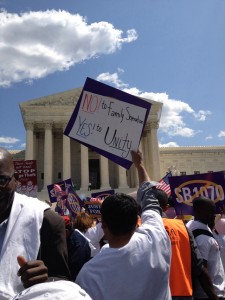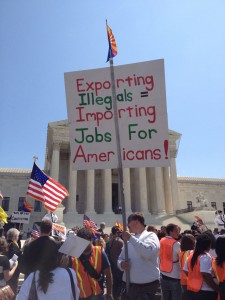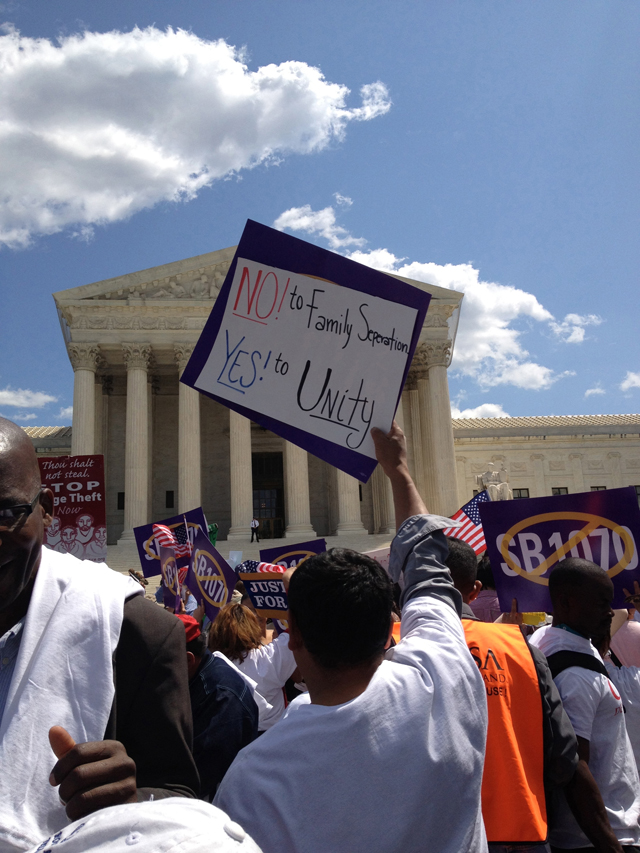WASHINGTON — “Los immigrantes, somos importantes!” protesters chanted Wednesday outside the Supreme Court. Immigrants, we are important.

Protestors gather in front of the US Supreme Court to protest Arizona's immigration law. Meghann Myers/MEDILL NEWS SERVICE
Others carried signs saying “Exporting illegals = Importing Jobs for Americans!”
Inside the Supreme Court building, the justices heard arguments Wednesday in a case that could overturn Arizona’s controversial immigration law. The two-year-old law requires local police to determine the immigration status of anyone they stop.
The protesters weren’t just Mexican-Americans or even Latinos – rabbis, monks, black college students and middle-aged white professionals all carried signs, listened to speeches or chanted in unison.
Opponents of the law say it amounts to racial profiling.
“I think it’s offensive that this is how Arizona is being represented in the United States,” said Katie Benton-Cohen, a Georgetown University history professor originally from Tempe, Ariz., where her family has lived for over 100 years.
“My family’s all in construction. Everybody works with immigrants,” Benton-Cohen said. “My grandfather was fluent in Spanish. His parents were immigrants from Eastern Europe. We’re all from immigrants.”
CASA of Maryland, an advocacy group for Central-Americans and U.S. natives of Central-American origin, made one of the biggest showings at the protest, with nearly a hundred protestors all in the same white tee shirt.
Not everyone feels the same. In one corner of the Supreme Court steps, the American Council for Immigration Reform set up a podium where proponents of the Arizona law spoke and at one point, a woman broke into a sing-along of “God Bless America.”
“Right now we’ve got millions of Americans out of work so we can’t afford to support all of these illegals who came here illegally, who are taking up jobs that Americans could be doing now,” said John Balazek, an unemployed steel worker originally from Riverdale, Md.

John Balazek of La Plata, Md. protests on the Supreme Court steps in support of the Arizona immigration law. Meghann Myers/MEDILL NEWS SERVICE
“They’re overwhelming our culture,” he said. “You can’t even grow to the grocery store because nothing’s in English. I’ve seen the place where I grew up turn into a third-world country.”
Opponents of the law said their presence outside the Supreme Court was about more than staging a protest, it was a way to bring attention to their own experiences thousands of miles from the Mexican border.
“If I ever go to (the affluent Washington suburb of) Bethesda, there are certain looks,” said Heidi Rosales, a University of Maryland student. “Just going to the grocery store and getting that look like, ‘You’re not supposed to be here, you’re supposed to be in another neighborhood,’ it hurts.”
Rosales is the daughter of a Guatemalan immigrant who crossed the border illegally and cleaned houses in Montgomery County, Md., to support her family. She is just trying to make a better life for herself, she said.
“The fact is, America is changing. It’s a growing population. But ‘browning,’ as you can call it, it’s not a wrong thing.”
The expansion of the Latino community in Maryland is a recent phenomenon, but as Rosales pointed out, Arizona’s Mexican-American history dates back to when it was physically a part of Mexico.
“It’s very difficult to see that many of them are being racially profiled in a place that they’ve had such a long history,” Rosales said.

